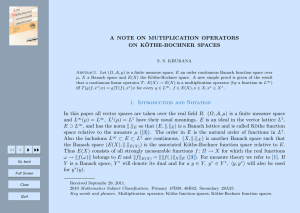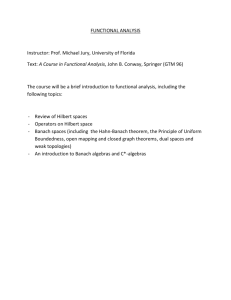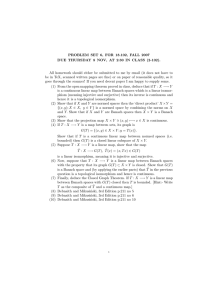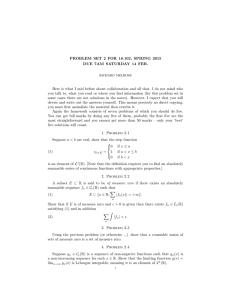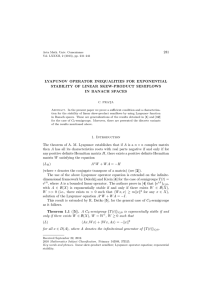141 A NOTE ON MUTIPLICATION OPERATORS ON K ¨ OTHE-BOCHNER SPACES
advertisement
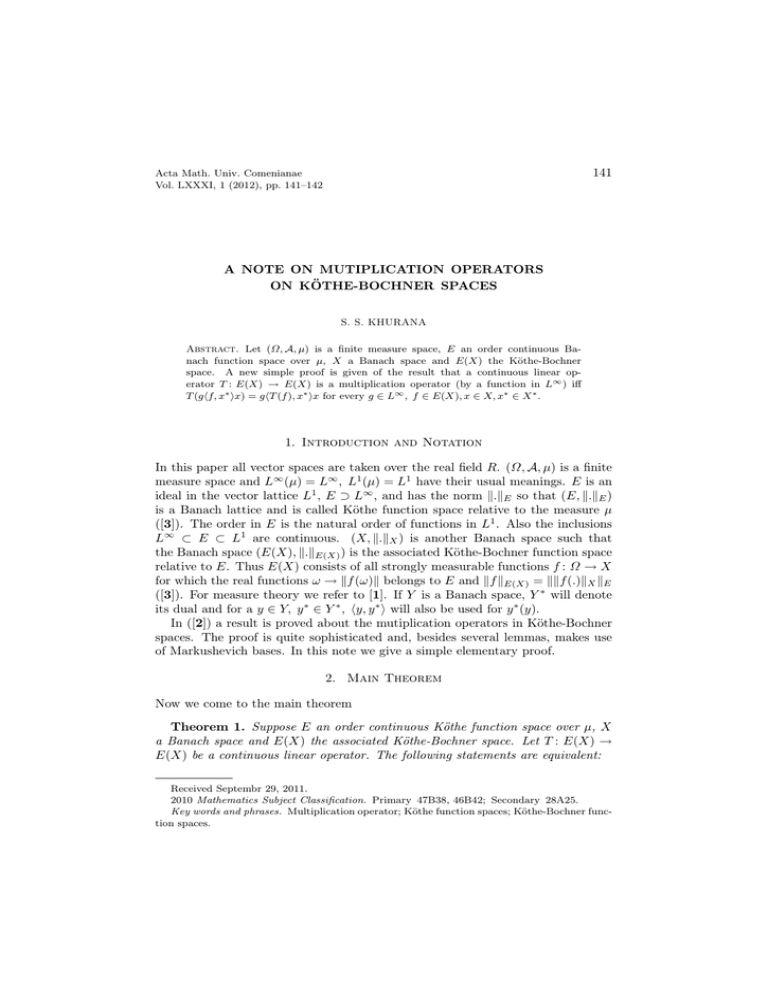
141
Acta Math. Univ. Comenianae
Vol. LXXXI, 1 (2012), pp. 141–142
A NOTE ON MUTIPLICATION OPERATORS
ON KÖTHE-BOCHNER SPACES
S. S. KHURANA
Abstract. Let (Ω, A, µ) is a finite measure space, E an order continuous Banach function space over µ, X a Banach space and E(X) the Köthe-Bochner
space. A new simple proof is given of the result that a continuous linear operator T : E(X) → E(X) is a multiplication operator (by a function in L∞ ) iff
T (ghf, x∗ ix) = ghT (f ), x∗ ix for every g ∈ L∞ , f ∈ E(X), x ∈ X, x∗ ∈ X ∗ .
1. Introduction and Notation
In this paper all vector spaces are taken over the real field R. (Ω, A, µ) is a finite
measure space and L∞ (µ) = L∞ , L1 (µ) = L1 have their usual meanings. E is an
ideal in the vector lattice L1 , E ⊃ L∞ , and has the norm k.kE so that (E, k.kE )
is a Banach lattice and is called Köthe function space relative to the measure µ
([3]). The order in E is the natural order of functions in L1 . Also the inclusions
L∞ ⊂ E ⊂ L1 are continuous. (X, k.kX ) is another Banach space such that
the Banach space (E(X), k.kE(X) ) is the associated Köthe-Bochner function space
relative to E. Thus E(X) consists of all strongly measurable functions f : Ω → X
for which the real functions ω → kf (ω)k belongs to E and kf kE(X) = kkf (.)kX kE
([3]). For measure theory we refer to [1]. If Y is a Banach space, Y ∗ will denote
its dual and for a y ∈ Y, y ∗ ∈ Y ∗ , hy, y ∗ i will also be used for y ∗ (y).
In ([2]) a result is proved about the mutiplication operators in Köthe-Bochner
spaces. The proof is quite sophisticated and, besides several lemmas, makes use
of Markushevich bases. In this note we give a simple elementary proof.
2. Main Theorem
Now we come to the main theorem
Theorem 1. Suppose E an order continuous Köthe function space over µ, X
a Banach space and E(X) the associated Köthe-Bochner space. Let T : E(X) →
E(X) be a continuous linear operator. The following statements are equivalent:
Received Septembr 29, 2011.
2010 Mathematics Subject Classification. Primary 47B38, 46B42; Secondary 28A25.
Key words and phrases. Multiplication operator; Köthe function spaces; Köthe-Bochner function spaces.
142
S. S. KHURANA
(i) There is a g0 ∈ L∞ such that T (f ) = g0 f for all f ∈ E(X).
(ii) T (ghf, x∗ ix) = ghT (f ), x∗ ix for every g ∈ L∞ , f ∈ E(X), x ∈ X, and
x∗ ∈ X ∗ .
Proof. (i) =⇒ (ii): Obvious.
(ii) =⇒ (i): For an h ∈ E, x ∈ X, g ∈ L∞ , we have T ((ghhx, x∗ i)x) = ghhT (x), x∗ ix;
take any x∗ ∈ X ∗ with hx, x∗ i = 1. We get T (ghx) = ghpx for some p ∈ E (note
since |hT (x)(.), x∗ i| ≤ kT (x)(.)k, we have hT (x)(.), x∗ i ∈ E) and so ghpx ∈ E(X).
p may depend on x. Suppose T (x1 ) = p1 x1 and T (x2 ) = p2 x2 . We claim p1 = p2 .
If x1 , x2 are linearly dependent, there is nothing to prove; otherwise x1 , x1 −x2 are
linearly independent. Take an x∗ ∈ X ∗ such that hx1 , x∗ i = 1, : hx1 − x2 , x∗ i = 0.
This means 0 = T (hx1 − x2 , x∗ iz) = hT (x1 − x2 ), x∗ iz = hp1 x1 − p2 x2 , x∗ iz =
(p1 − p2 )z, for all z ∈ E. From this it follows that p1 = p2 .
Now we want to prove that p is bounded. Suppose this is not true. Select
a strictly increasing sequence {cn } of positive real numbers such that (i) cn in3 ,
(ii) µ(Qn )i0 where Qn = |p|−1 (cn , cn+1 ). For each n, choose positive αn so that, for
the functions
fn = αn χQn , kfn kE = 1. Fix a y ∈ X with kykX = 1. The function
P∞
f = n=1 n12 fn is in E and f ≥ n12 fn . This gives f |p| ≥ n12 fn |p| ≥ n12 fn n3 and
so kf |p|kE ≥ n for all n. Now kT (f y)kE(X) = kf pykE(X) = kf |p|kE ≥ n for all n,
which is a contradiction. So p ∈ L∞ . We put g0 = p. Thus T (gx) = gg0 x, for all
x ∈ X, g ∈ L∞ and so T (h) = g0 h for all simple functions h ∈ E(X). Since E is
order continuous, simple functions are dense, and so the result follows.
References
1. Diestel J. and Uhl J. J., Vector Measures, Amer. Math. Soc. Surveys vol. 15 Amer. Math.
Soc., 1977.
2. Calabuig J. M., Rodriguez J. and Sanchez-Perez, E. A., Multiplication operators in KötheBochner spaces. J. Math. Anal. Appls. 373 (2011), 316–321.
3. Lin, P. K., Köthe-Bochner function spaces. Birkhauser Boston Inc., MA, 2004.
S. S. Khurana, Departemt of Mathematics, Univerisity of Iowa, Iowa City, Iowa 52242, U. S. A.,
e-mail: khurana@math.uiowa.edu
